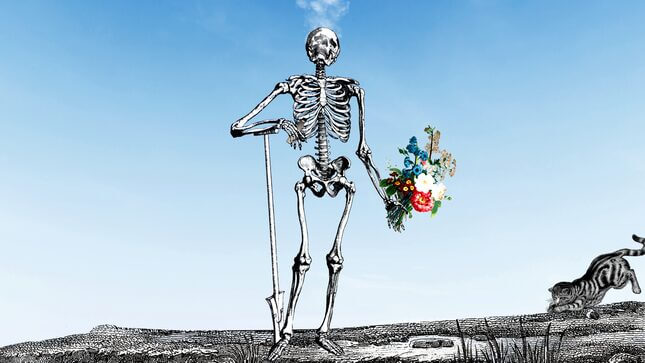Try A Little Earnestness
Latest
Illustration: Elena Scotti (Photos: Getty Images)
During moments of personal or professional crisis, my first and only instinct has been to fix the problem by leaning hard into nihilism, reminding myself that in the end, nothing really matters; human relationships are largely immaterial; and at the end of the day, we are all going to die alone. This line of thinking, which is irrefutably true in the grand scheme of things, generally works to fix whatever’s broken. Take the good with the bad and trudge on, but don’t dare invest an ounce of your heart, because disappointment lurks around every corner. Prepare for the worst, expect the best, and come out somewhere in the middle.
The nihilism I have leaned on is in service of self-preservation: a succinct summation of my philosophy as evidenced by my work. For the duration of my adult life, I have railed hard against the mushy concept of earnestness, in an attempt to craft the kind of rock-hard, steely-eyed exterior that I hoped, in a youthfully misguided way, would serve as inoculation against the various terrors the world proffers daily. Affecting an ironic and detached nihilism about anything and everything under the sun works to a certain point because it smooths the edges of difficulty. It’s a necessary self-soothing tactic designed to prevent the discomfort of real emotion and a way to shut up anxiety about anything. Climate change. Mass shootings. Cataclysmic earthquakes. To mull over any of these facts for longer than three seconds causes intestinal and existential distress. Thus, the reminder persists: None of this matters because we are all going to die. But our current moment dictates a need for some change, and sadly, I realized that I had to course correct.
Nihilism in and of itself is exhausting, a fact that even the rudest bitch in the room (hell0) can acknowledge. Reminding oneself constantly of death’s inevitability as a coping mechanism calls up the very notion of death and what it means to actually cease existing: a fear that has, occasionally, kept me up at nights when I have improperly timed the consumption of an edible and have gravely misjudged its strength. Ruminating over life’s greatest mystery, though, produces more anxiety that compounds upon pre-existing horrors, eventually causing a circular logic feedback loop that never shuts up.
“Anxiety is a pathological response to uncertainty,” a friend once said to me. “Just sit in it and know that it’s normal.”
When the very system of self-maintenance breaks, the panic that ensues is real. In a free-fall, I turn to methods that I had previously shunned. Meditation temporarily eases the bad feeling enough to be able to function on a daily basis. I engage in fact-finding missions that are essentially an attempt to cobble together a version of the truth that makes sense not only to me, but to others as well. Therapy brings one hour of immediate relief, followed by a blissful afterglow that usually fades, leaving room for my worst thoughts to sit squarely on my chest for hours at a time. Restorative yoga, essentially adult nap time for $25 an hour, is the only thing that stills my mind completely. With my legs draped over a bolster tooted up on two yoga bricks, a blanket resting over my my midsection, and an eye pillow draped across my face, I am prone to believe that the light in me really does see the light in you. I do not mind being asked to “hold space” for my breath. I will probably never be able to whisper a peaceful namaste with a straight face, but I am fine if others do it in my general vicinity. The feeling that follows yoga is not bliss, but quiet. My back feels better and also, my brain has ceased its incessant ramblings. The medically-induced coma I desire is no longer necessary. This is close enough.
-

-

-

-

-

-

-

-

-

-

-

-

-

-

-

-

-

-

-

-

-

-

-

-

-

-

-

-

-

-

-

-

-

-

-

-

-

-

-

-








































